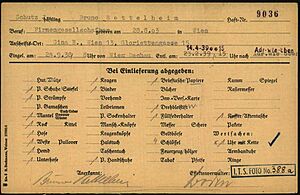Bruno Bettelheim facts for kids
Quick facts for kids
Bruno Bettelheim
|
|
|---|---|
| Born | August 28, 1903 |
| Died | March 13, 1990 (aged 86) Silver Spring, Maryland, United States
|
| Nationality | Austrian, American (since 1944) |
| Citizenship | United States |
| Alma mater | University of Vienna |
| Known for | Autism research The Uses of Enchantment |
| Spouse(s) | Gina Alstadt (1930–?; divorced) Gertrude Weinfeld (1941–1984; her death; 3 children) |
| Scientific career | |
| Fields | Child psychology |
| Institutions | University of Chicago Sonia Shankman Orthogenic School Stanford University |
| Doctoral students | Benjamin Drake Wright |
Bruno Bettelheim (born August 28, 1903 – died March 13, 1990) was an Austrian-born psychologist and writer. He spent most of his career in the United States. He was known for his work with children who had emotional difficulties.
Bettelheim studied Sigmund Freud's ideas. He believed that children with emotional problems were not born that way. He thought they could get better with special therapy. This therapy did not use harsh treatments like shock therapy. In the 1960s and 1970s, he became famous for his ideas about autism and child psychiatry.
After he passed away, some of his work was questioned. There were concerns about his education and claims that he treated patients poorly. Some also said he copied parts of his writings.
Contents
Early Life in Austria
Bruno Bettelheim was born in Vienna, Austria-Hungary, on August 28, 1903. When his father died, Bruno stopped his studies at the University of Vienna. He needed to help with his family's sawmill business.
Later, as an adult, he went back to the University of Vienna. There are different ideas about what he studied. Some records show his main degree was in art history. He also took some basic psychology classes.
Bettelheim's first wife, Gina, cared for a troubled American child named Patsy. Patsy lived with them in Vienna for seven years. Some people believe Patsy might have had autism.
Bettelheim was Jewish, but his family was not very religious. In 1938, Austria was taken over by the Nazis. Many Austrian Jews and political opponents were sent to concentration camps. These were places where people were treated very badly.
Bettelheim was arrested on May 28, 1938. He was held in the Dachau and Buchenwald camps for about ten months. He was released on April 14, 1939. This was part of a special release for Adolf Hitler's birthday. Bettelheim later used his experiences from the camps in his writings.
Career in the United States
Bettelheim moved to New York City in late 1939. He came as a refugee to join his wife, Gina. They later divorced. He then moved to Chicago and became a U.S. citizen in 1944. He married Gertrude ('Trudi') Weinfeld, who was also from Vienna.
Working with Children
In Chicago, Bettelheim got a job at the University of Chicago. He became a professor of psychology. He also became the director of the Sonia Shankman Orthogenic School. This school helped children with emotional difficulties. He worked there from 1944 until he retired in 1973.
Bettelheim wrote many books about psychology. For a while, he was very well-known for his work. He focused on the ideas of Sigmund Freud and how to help children with emotional problems.
At the Orthogenic School, Bettelheim created a special environment. He called it "milieu therapy." This meant children could form strong bonds with adults. They lived in a structured but caring place. He believed this helped many children get better. He wrote books about both normal and unusual child psychology. He became a very important person in this field.
Even people who disagreed with him said he truly wanted to help these children. He used methods that he hoped would lead them to happy lives. He believed that therapy could help people change and adapt to their surroundings. This would happen if they received proper care and attention.
In 1971, Bettelheim was chosen as a member of the American Academy of Arts and Sciences. After he retired in 1973, he moved to California. He continued to write and taught at Stanford University. His wife passed away in 1984.
Understanding Fairy Tales
Bettelheim wrote a famous book called The Uses of Enchantment in 1976. In this book, he looked at fairy tales using Freud's ideas. He talked about how important fairy tales are for children's feelings and understanding.
He included old tales that some people thought were too dark. These included stories by the Brothers Grimm that had witches, death, and injuries. Bettelheim thought these dark parts helped children deal with their own fears. He believed that if children could read and understand these tales, they would find more meaning in life. He felt that engaging with these stories helped children grow emotionally. This growth would prepare them better for their own futures.
In the United States, Bettelheim won two big awards for The Uses of Enchantment. These were the National Book Critics Circle Award and the National Book Award.
However, in 1991, some people said that parts of his book were very similar to another author's work. They said he had copied from Julian Herscher's book, A Psychiatric Study of Fairy Tales.
Later Life and Death
Towards the end of his life, Bettelheim struggled with sadness. He seemed to have dealt with depression for much of his life. In 1990, his wife had passed away. He was also in poor health and had a stroke. The stroke affected his mind and made part of his body unable to move. He passed away on March 13, 1990, in Maryland.
See also
 In Spanish: Bruno Bettelheim para niños
In Spanish: Bruno Bettelheim para niños
 | Bayard Rustin |
 | Jeannette Carter |
 | Jeremiah A. Brown |


